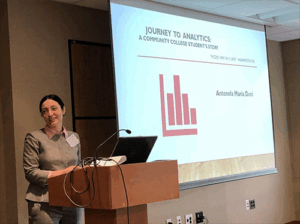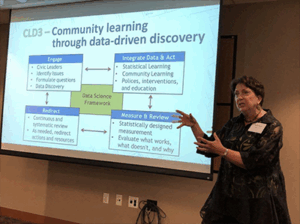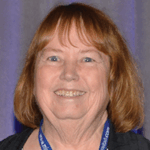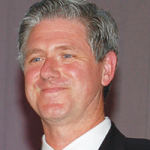ASA Hosts Summit to Discuss Data Science Curricula for Two-Year Colleges
Seventy-three representatives from two-year colleges, four-year colleges and universities, government, and industry gathered in May to discuss the future of data science education at two-year colleges.
Funded by the National Science Foundation in an award to the American Statistical Association, the Two-Year College Data Science Summit (TYCDSS) took place in the facilities of Booz Allen Hamilton (BAH) in Arlington, Virginia, May 9–10. The summit, convened by the ASA, included representatives from professional associations such as the American Mathematical Association of Two-Year Colleges (AMATYC), Association for Computing Machinery (ACM), and Mathematical Association of America (MAA). The summit also included those who have been working to develop educational pathways in data science, including the Park City Math Institute Undergraduate curriculum guidelines, National Academy of Sciences undergraduate report on data science, and Oceans of Data Institute’s profiles of big data and data science practitioners.
Rob Gould, University of California at Los Angeles (program co-chair)
Roxy Peck, California Polytechnic State University, San Luis Obispo (retired) (program co-chair)
Beth Hawthorne, past-chair of the ACM Committee for Computing Education in Community Colleges and vice chair of the ACM Education Board
Nicholas Horton, Amherst College
Randy Kochevar, Oceans of Data Institute
Brian Kotz, Montgomery College and chair of the AMATYC Data Science Subcommittee
Mary Rudis, Great Bay Community College
Brad Thompson, Delaware Technical Community College
Heikki Topi, Bentley University
ASA staff support included Donna LaLonde and Steve Pierson, who served as the NSF award principal investigator.
The primary goal of the summit was to develop sample curricula that could be used to guide the development of future programs. Discussions focused on the key principles and practices that would be appropriate for the following three pathways/themes:
- Two-year degrees intended for transfer to four-year colleges and universities
- Two-year degree programs intended for students who wish to go directly into the workforce
- Certificate programs intended for professional development
The secondary goals of the summit were to summarize the current state of data science/analytics programs at two-year colleges, identify challenges in establishing such programs at two-year colleges, and identify necessary resources for two-year colleges when creating a data science/analytics program.
The goals of the summit were met through active discussion and engagement. Participants were split into six discussion groups, with two groups devoted to each of the themes. Each discussion group had representatives from the communities above, when possible. Groups were charged with generating program outcomes and defining the intended student audience. Time was given for inter-group discussions and feedback.
A number of key themes emerged from the process. All agreed there is need for a workforce capable of analyzing, storing, managing, and sharing data. The consensus of the participants was that two-year colleges will play an important role in filling this need. Several participants spoke to the demand of hiring great numbers of data professionals at the associate level in the near future, and, in particular, thought this need required a system of strong data science programs at two-year colleges.
After welcoming comments from program co-chairs Rob Gould of the University of California at Los Angeles and Roxy Peck—retired from California Polytechnic State University, San Luis Obispo—as well as NSF program officer Corby Hovis, Sallie Keller—founder and head of the Virginia Tech Social and Decision Analytics Laboratory and 2006 ASA president—gave a kick-off plenary talk. She began her undergraduate education at a two-year college and transferred to complete a bachelor’s degree before subsequent graduate training. Keller described the data science work her laboratory does and how it demonstrates the societal importance of statistics and data science.

Photo by Nicholas Horton
Two-year college data science student Antonela Duni provides her perspective at the summit.

Photo by Nicholas Horton
Sallie Keller, who started her undergraduate career at a two-year college, delivers the keynote for the summit.
Antonela Duni, a student and spring 2018 graduate of Great Bay Community College—one of the first colleges to offer a certificate in data science—provided the student perspective. Aaron Burciaga, vice president of data science and artificial intelligence at Booz Allen Hamilton, also spoke to the group, sharing his enthusiasm for two-year colleges providing data science training. Additionally, fellow BAH employee and prominent data scientist Kirk Borne participated in the entire summit.
Writing groups are formulating reports of the three themes, with drafts expected this summer. The organizers have also set up a Google Group for participants and others to share resources and work to build a broader network of educators.
Participants were enthusiastic about the summit, for its usefulness—both in content and networking—and organization. Many urged it be an annual workshop to foster the growth of the emerging community interested in two-year college data science education.



















